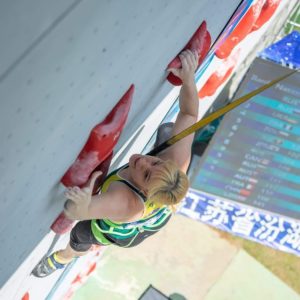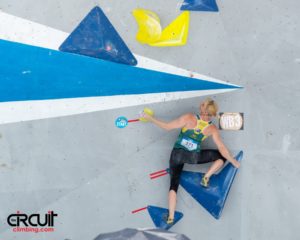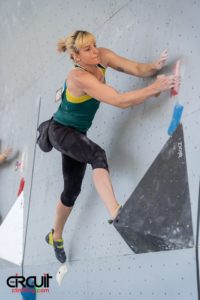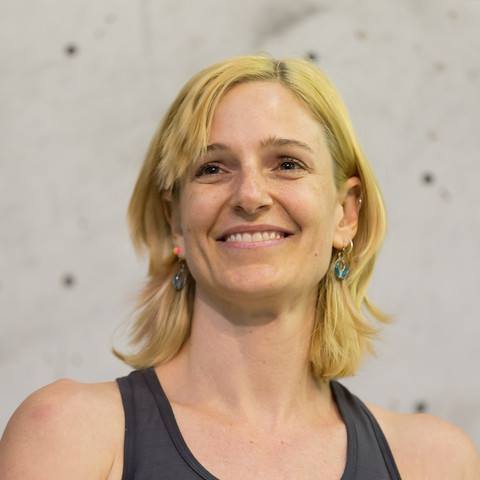“The heavier the burden, the closer our lives come to the earth, the more real and truthful they become. Conversely, the absolute absence of burden causes man to be lighter than air, to soar into heights, take leave of the earth and his earthly being, and become only half real, his movements as free as they are insignificant. What then shall we choose? Weight or lightness? …When we want to give expression to a dramatic situation in our lives, we tend to use metaphors of heaviness. We say that something has become a great burden to us. We either bear the burden or fail and go down with it, we struggle with it, win or lose.” – Milan Kundera, The Unbearable Lightness of Being
CHINA

Copyright Eddie Fowke/The Circuit Climbing 2019

Copyright Eddie Fowke/The Circuit Climbing 2019
In the lead-up to the Chinese World Cups, my life was very busy. Not that that is unusual, but more just a statement of fact. If you are interested in what my life is like, read this blog. I had also been dealing with an issue with my left hip since October 2018, and the constant pain was exhausting me. I was seeking out alternatives to my usual physiotherapy, osteopathy and massage because they didn’t seem to be helping long-term. I explored the mind-body connection, spending emotional energy on coaching and possible symbolic or root causes of this particular issue.
At the same time, my partner Simon was stressed and struggling with work relationships to a degree that I had never seen in the nine years we’d been together. He was also tired from being away a lot and setting at events, so between our schedules, we didn’t have a lot of time with each other.
I had given myself plenty of time in China before the first World Cup in Chongqing on April 27-28 – to decompress, adjust to jetlag, relax, with time for just me. I enjoyed the restful time alone with little-to-no obligations, but I found myself holding a deep sadness at bay. A sadness that I now accredit to a lack of balance in my day to day life leading up to the trip, and the environment in Chongqing of buildings, smog, traffic, and people, in a way that compounded what I was already experiencing. On the day of my first competition, one of my critical admin staff resigned.
I under-performed in Chongqing. While I got a personal best time in speed, it hadn’t shaved as much off my previous personal best as I had expected after six months of training. In bouldering I over-complicated the sequences of the problems and took too long, and too many tries on problems that I should have topped, or at least scored on. My result was the worst I have ever gotten, at the time that I was supposed to be performing my best. After 18 months of dedicated training towards this goal, and 20 years of experience behind me, I was the comparative worst I had ever been. And of course I loaded this result on top of my perceived failures at the World Championships in Innsbruck in September 2018, and the Canadian National Bouldering Championships in March 2019.
Between the two Chinese World Cups I struggled. A lot. I didn’t feel that I could debrief the competitions without bursting into tears. My personal coach was unable to support me. The Australian team coach was there for me, but without knowing me well, his ability to support me in the way I needed was limited. I was away from my friends, family, and partner. Most of the athletes are at least a decade younger than me, and I was closer in age to parents and officials. I don’t know the members of the Australian team well (and they all have their own connections within themselves and others on the circuit), and the Canadian team does their own thing now. I felt like I was in limbo without a strong connection to anyone or anything. I found myself in a spiral of negative self-talk that I couldn’t get out of. I have many tools that I have accumulated over the years to help me handle situations such as this, but for whatever reason I couldn’t move myself through this particular situation. For me it’s a big warning sign when I can list things that I am grateful for, but not actually feel the gratitude in any of it.
After almost a week of this, I had a session with Madeleine Eppensteiner, a former competitive climber and sports psychologist. What I like about her approach is the combination of sports psychology tools and methods similar to what life coaches use – an approach that I know works for me. The content of the session wasn’t really important, but what I realised after the session was, that I was letting everything in my life, and the world, overwhelm me, rather than taking things one at a time. It’s like, although I was conscious of being present in every moment, I was bringing the weight of everything that was happening in my life – work, relationships, training, competing, world issues etc. – into every single moment. So I had to start asking myself, “what is relevant to me here, now, in this moment?”, and letting everything else go. This allowed me to bring a clarity into each moment, and in turn, I was able to move out of the negativity and into a more positive frame of mind.
The second World Cup felt lighter. The setting of the competition was nicer – lake view from my bedroom window, short walk through a green park to get to the competition area, warming up on grass and under the trees – and with my new clearer state, I was able to set another two new speed personal best times, finally making it down into the 11 second bracket, and to boulder in a way that eliminated many of my mistakes from the previous competition. I was also able to connect with an old friend who was at the comp in an official capacity with another team, and feeling that sense of belonging that comes from the familiarity of long-term friendship and acceptance had a lasting impact.
COMING HOME
I was happy to go home. But coming back to ‘normal’ life also meant the return of relevance of many of the ‘big picture’ things that had brought me down in the first place: the life challenges my partner was going through; serious and urgent issues that needed my attention at work; the physical issues I was having; the full context of my recent competition experiences; and the big picture issues of the world. With so much struggle – social injustice, poverty, climate change – why was I spending my life, my time, my (donors’) money, on something as frivolous as trying to make a competition that was arbitrarily selecting athletes for global representation?
All of this manifested for me in a number of ways. My inner critic became VERY active. For those of you who have been following my story for a while, you will know that one of my greatest successes in life was the process of building a relationship with my critic to the point where he had nothing to say. Now of course this is not a static or permanent state, but I don’t recall a time when that critic was so loud – before or after that experience. I also developed body image issues due to the critic’s voice being so prominent. Feeling fat and old; like my muscles and skin were saggy and weak; that I was not worthy of praise or admiration. There was a self-resentment because I felt that my body wasn’t capable of doing what I wanted it to – like it had let me down. I have been lucky to have avoided significant body image neuroses most of my life, so this was disturbing in its newness.
I questioned my goal. Although making the Olympics was the outcome goal, the process goal for me has always been to see how far I can go on the world stage, when I commit 100% to it, within the circumstances of my life (and to share my experiences). With my recent results not being any kind of improvement over (or even holding steady with) my previous world cup results, I wondered if I had actually already achieved that – that I had seen how far I could go, and that I wasn’t capable of any more. I had also said, right from the start, that if I did make the Olympics, I did not want to be so far behind the rest of the field that I was an embarrassment to Australia, my friends and family, my team, my coach, and myself. With my results not being what I wanted them to be, I felt that this was a distinct possibility. And if this was the case, what was the use in even trying to make it anymore?
I dealt with this by reaching out to friends and family, telling them what was going on, and asking them to just hold me in acceptance during this challenging time. It is not their role to fix me – any solutions were going to need to come from me and be done by me – but feeling like I had allies in the process was very important. I tried to be kind with myself – knowing that my mental health was in jeopardy I re-prioritised my emotional body over the training that I needed to do for my physical body. And I reached out to my coach. In the same conversation, he both said that he felt I had more performance in me than I had shown to date, and that he could no longer work with me.
VAIL

Copyright Eddie Fowke/The Circuit Climbing 2019
I made the decision to see out the season that I had already planned for – Bouldering World Cup in Vail, USA; the Lead & Speed World Cups in Villars, Switzerland, and Chamonix, France; the Lead World Cup in Briancon, France; and the World Championships in Tokyo, Japan. After that I could re-evaluate if I wanted to continue on this journey. I felt happy having made this decision. It took the pressure off me to make a decision right away, and gave me other opportunities to ‘redeem’ myself.
I love Vail as a town, and the atmosphere of the GoPro Mountain Games is incredible. So much joy and positivity around outdoor pursuits – I just love it! The natural setting makes a big difference as well – part of my acclimatisation to the altitude is to do hikes and physical activity in the mountains, and this always brings me joy. The competition itself is often hard, but since this was to be my 4th showing, it was at least familiar. I had friends around me (the family of a physio I had seen the first year I visited Vail and who I have stayed in touch with, and climbing friends from Seattle), as well as feeling the support of an Aussie family – there was only one other Australian in this competition and her mother and grandmother came too. They all welcomed me in a way that made me feel like I was not alone.
I left Vail with a decent result, and many compliments on my commentating for the Women’s Final.
WORK
From the day I left Vail, and for over two weeks afterwards, I was sick. I was not able to train, not even light activity, without being completely out of commission for the next two days. My body was telling me I needed a significant break.
A couple of days after I got back from Vail I also learned of another critical admin staff member’s resignation. Having been unable to fill the first vacant admin position through a full round of recruitment, I found myself facing a dilemma. If I continued with my plan of attending the European World Cups, I would be leaving the one remaining admin staff on her own to manage the entire office and the demands of two vacant positions, as well as overseeing two temporary staff who she is not technically responsible for. And I would be trying to recruit for these (and a couple of other) positions while on ‘vacation’ in Europe, which would mean that I probably wouldn’t be giving my best to the competitions either. I would also be leaving my management team with additional responsibilities in my absence, and with a few other highly important pieces in the mix, I just couldn’t see how I could go – despite being excited about the trip after having made the decision to commit to them. So around $1,500 in cancellation fees later, I have missed those three European World Cups, gone back to work fulltime hours for six weeks, and maintained almost the same training schedule.
It also means that I will likely have to go back to Australia for Nationals in November, to ensure my best chance for Olympic qualification. I was hoping that my results at the World Cups would be good enough that I could apply for special consideration to the Australian team being selected for the (Olympic qualifying) Oceania Continental Championship competition; but now I don’t have sufficient results for that to be possible.
NOW
So where am I now? I am determined to see this through all the way to the end. It is likely that I only have two significant competitions to go after Worlds – the Australian Combined Nationals in November 2019, and the Oceania Continental Championships in April 2020 – and the dark despondency that I experienced in China has passed. But I know that that was a warning sign to me, and I am paying attention.
I am choosing to modify my training sessions and schedule based on emotional/mental fatigue, not only physical fatigue. I am saying no to anything extraneous that feels slightly challenging or stressful – I have enough of that in what I HAVE to do, let alone what I choose to do. I am prioritising time at home with myself and my partner over time out and with others. I am taking my mum to training sessions with me by voicecall on bluetooth headphones so I have someone to train with even when I am alone. And instead of pushing myself to the limits of what I am capable of, physically and mentally, where there is the risk and the history of tipping over into the unhealthy, I am staying just a little further back from the edge of my limits, in a place where I know I can stay well. And if it’s to the detriment of my performance, so be it – it’s for the benefit of my long term mental health. There is also the possibility (the hope? the likelihood?) that my performance will actually be better if my head is in a better place.
So I choose to bear my burden, come closer to the earth, and live the real and truthful life, however difficult that may be.


Tiff thank you for this blog reading this I can relate in so many ways the feeling of being overwhelmed and alone is debilitating. Taking a step back to look after yourself and being with Si is the best way. It’s amazing how so much busyness takes over your life. (wish I could assist you re work). As you know your Aussie friends & family are right behind you no matter the outcomes or decisions you make. Look after that headspace – don’t forget to take time out to smell the roses.
Thank you so much Jennie, and you know that your resilience and perseverance inspire me too!
I am so glad you wrote this, so we know what you have been going through. You have figured it out. Love you,
Thanks Auntie Janie!